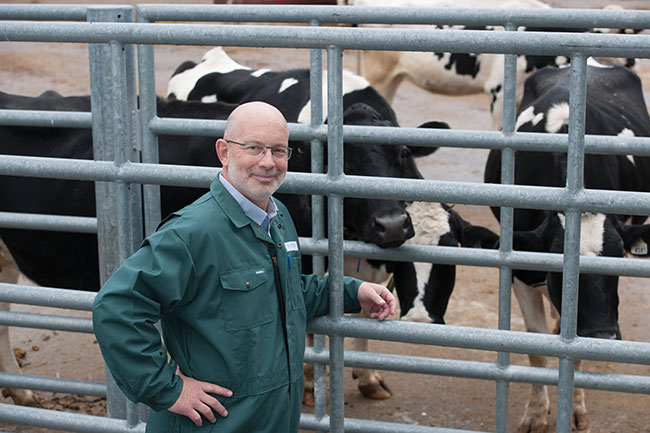
Livestock research needs more collaboration
By Lilian Schaer, Livestock Research Innovation Corporation
Features ResearchCooperation needed to address complex, multi-faceted challenges.
 Dr. Jeffrey Wichtel, dean of the Ontario Veterinary College, is helping to lead a University of Guelph effort to improve cross-sectorial collaborative research. PHOTO CREDIT: OVC Marketing and Communications.
Dr. Jeffrey Wichtel, dean of the Ontario Veterinary College, is helping to lead a University of Guelph effort to improve cross-sectorial collaborative research. PHOTO CREDIT: OVC Marketing and Communications. Many challenges facing livestock and poultry farmers are complex and multi-faceted and require a broad spectrum of expertise that extends beyond the individual species.
That’s why Livestock Research Innovation Corporation (LRIC), commodity organizations and the research community are increasingly focusing on a cross-sectoral approach where different teams work on specific aspects of a particular issue, like antimicrobial resistance or gut health. Not only does this reduce duplication of research and stretch limited dollars, but it also fosters new ways of thinking about solutions.
A cross-sectoral approach can also mean including processors and retailers alongside farmers and researchers or creating collaborations across multiple research disciplines. These partnerships have proven to be very effective, says Dr. Jeffrey Wichtel, dean of the Ontario Veterinary College.
A leading example is the University of Guelph’s new One Health Institute, which works across disciplines to address health challenges like antimicrobial resistance that impact human, animal and environmental life. Wichtel is chair of the institute’s advisory board.
Academic research projects and programs are traditionally set up along departmental lines within colleges, which doesn’t encourage broader collaborations. Several initiatives at Guelph demonstrate the value of collaboration, but more can be done.
“It’s important to be talking about how we can change those structures, incentives and processes to encourage more collaboration,” Wichtel says.
That’s where Dr. Rene Van Acker, dean of the Ontario Agricultural College, believes LRIC and livestock organizations can harness their government relationships to seek support for agricultural research and innovation needs.
That includes continued funding for research programs and new infrastructure, like renewal of Ontario’s poultry research facilities. But it’s also about encouraging a shift in thinking around how those research programs are structured and including incentives for collaboration, which will result in society-wide benefits.
“I don’t think we see ourselves enough in the reality of what our sector is really all about,” Van Acker says. “Research and innovation that helps Canadian farmers results in the protection and improvement of the health of Canadians and of our shared environment and economic growth – and that’s what we all want.”
Soil health could benefit from collaboration because of its crucial role in sustaining farm productivity and direct links to the carbon cycle, greenhouse gases and climate change. And as society’s view of animals continues to change, there is tremendous benefit from a collaborative approach to welfare.
Van Acker and Wichtel are members of the Deans’ Council – Agriculture, Food & Veterinary Medicine, which now works closely with national organizations to encourage cross-sectoral solutions.
LRIC leads the development of an annual list of cross-sectoral research priorities for the Ontario Agri-Food Innovation Alliance Research Program.
It has also introduced a mentorship program for new University of Guelph faculty to learn about the livestock sector and recently launched a Horizon Series of white papers and webinars on leading issues. “Every livestock sector, large or small, values research and innovation. I hear from them, academia and government that we want more cross-sector research initiatives,” says LRIC CEO Mike McMorris. “Our Horizon Series highlights the top areas with potential for cross-sectoral research and will hopefully stimulate some follow-up action.”
Livestock Research Innovation Corporation (LRIC) fosters research collaboration and drives innovation in the livestock and poultry industry. Visit www.livestockresearch.ca or follow @LivestockInnov on Twitter.
Print this page